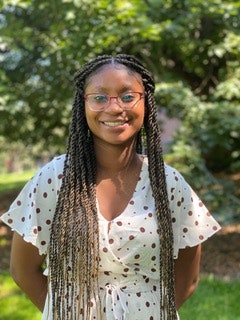
At 32 years old, Mirinda M. Morency represents a new generation of scholars who understand that meaningful research begins with lived experience and community connection. As a fifth-year doctoral candidate in the joint developmental and clinical psychology program at the University of Minnesota, Morency’s journey to academia has been anything but traditional, and that’s precisely what makes her work so compelling.
“I place Mirinda very high among the students I have trained in intellectual merit, life experiences in promoting health, and potential for broad impact in the field,” says Dr. Megan R. Gunnar, Regents Professor at the University of Minnesota, who nominated Morency as a Rising Graduate Scholar. “Her ability to work well as part of a collaborative team is fabulous, as Mirinda is remarkably adept in working with students and faculty from diverse backgrounds and experiences.”
Growing up in the south suburbs of Chicago as the daughter of Haitian immigrants, Morency was the first in her family to attend college. Her path to higher education began at Loyola University Chicago, where she became a McNair Scholar, a program that would prove pivotal in introducing her to the world of psychological research.
“My mentor was a Black psychologist, and I was like, ‘oh, yes,’” Morency recalls of that transformative undergraduate experience. Working alongside her mentor on community violence prevention work on Chicago’s west side, she found herself immersed in neighborhoods with concentrated crime, learning firsthand about the challenges facing urban communities.
This early research experience wasn’t conducted from an ivory tower. Morency was on the ground, working directly with youth and families, asking crucial questions about resilience and protective factors.
“We know about all these risks, but what are the protective factors? How can we leverage strengths within the community that already exist and sustain that to sort of mitigate the negative effects of being in a high-crime, impoverished area?” she asks.
Rather than heading straight to graduate school, Morency made what she calls a “detour” to Columbia University, where she earned a master’s degree in social work. This decision reflected her desire to stay connected to direct service and community-based work. During her time in New York, she engaged in individual therapy work and discovered how her identity as a Black woman impacted the communities she served.
However, the limitations of the social work system soon became apparent.
“We’re doing therapy, we’re working through trauma, but you’re still worried about where you’re going to lay your head down at night,” she explains. This realization sparked her desire to pursue macro-level work, research that could inform policy and systemic change rather than just individual intervention.
Now in her final year of doctoral study, Morency’s dissertation explores what she terms the hidden costs of appearing resilient. Her research focuses specifically on Black youth who seem to be thriving despite experiencing chronic stress from environmental disadvantage and structural racism.
“Just because they look resilient doesn’t mean that we should leave them alone,” says Morency. “Resilience is multidimensional, multifaceted. So just because they look like they’re thriving, they’re doing well in school, doesn’t mean that we should not keep an eye on them. There might be some physiological things happening underneath the skin that we should be paying attention to.”
This nuanced understanding of resilience challenges conventional wisdom and has the potential to reshape how educators, policymakers, and practitioners support young people navigating adversity.
Throughout her journey, Morency has been sustained by strong mentorship relationships. She credits early research mentors with believing in her potential and providing opportunities she couldn’t initially see for herself.
“They really spoke life into me,” she reflects, noting how important it was to see herself represented in academic spaces.
Gunnar, her current advisor at Minnesota, has continued this tradition of support, helping her navigate the challenges of doctoral study. Morency’s mother, despite English being her second language, has also been a constant source of encouragement, always connecting her daughter with people who could provide guidance she couldn’t offer herself.
This experience has made mentorship central to Morency’s future vision.
“I love mentorship. It’s really important to me to talk to the next generation of scholars, just how I was sort of funneled through. I think that really makes an important difference.”
As Morency prepares for her internship year and eventual entry into the job market, she envisions a career that bridges research and clinical practice. Whether in academia, a research institute, or through community partnerships, she’s committed to “holding space for marginalized communities” while generating knowledge that can inform interventions, programs, and policies.
Her advice to aspiring graduate students reflects her own journey: “Put yourself out there, ask a lot of questions. You have a voice, you have a spot, and don’t shy away from that. People are always excited to talk about their journey, so just ask questions and don’t be afraid to take up space.”















